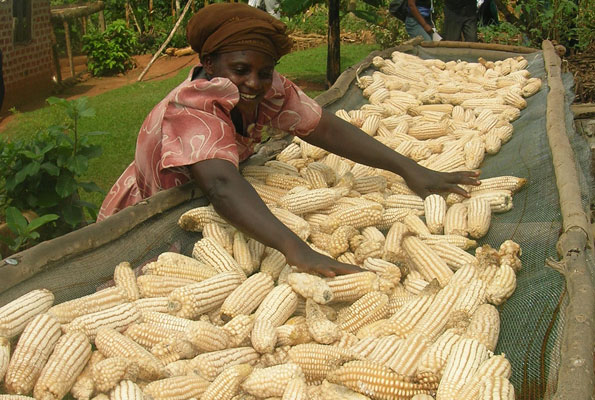By George Aine
The government is set to launch the Uganda National Commodity Exchange Ltd (UNCE) with online trading capabilities in a bid to streamline trade in maize and other cash crops.
Ms. Khadija Nakakande, the senior public relations officer in the Ministry of Trade, on Wednesday, said UNCE will have seven licensed warehouses and four brokerage companies well equipped with manpower and machines that can dry, clean and grade maize for export standards.
Ms. Nakakande said UNCE is supposed to operate in tandem with the warehouse receipt system which is managed by the Uganda Warehouse Receipt System Authority.
Through the two systems, small-scale producers and traders will deposit their commodities at certified and licensed storage facilities (silos & warehouses) owned by the private sector. It is at this level that the quality of exportable agro-commodities will be assured.
The farmer takes the commodities to the warehouse where he/she is given a receipt for the value of the commodities. By getting into the system, farmers will decide on the price of commodities. It is that receipt that he/she takes to the UNCE Ltd to be transacted on the trading floor.
“Commodities in the warehouse are sold by the warehouse depositors using the electronic warehouse receipts to the trading floor to sell for them. It is after the quality has been ascertained that a warehouse receipt will be issued to the depositor – that is a farmers group, commercial producer or small-scale trader),” she says.
See also: Nataliey Bitature: How to stay on top of your game as an entrepreneur
This receipt can then be traded on the Commodities Exchange as an avenue that exposes the small producer group to the exporters. The trading floor is supposed to get a percentage of the payment when the transaction is complete. The figure for the percentage has not been agreed on yet but initially, it stood at 0.5 percent.
Chairperson Uganda Agribusiness Alliance Ms. Victoria Sekitoleko doubts it will stabilize prices because of the way commodity exchanges operate but believes it will increase access to information.
Together with the Warehouse Receipt System, the new National Commodity Exchange will be beneficial to exporters (Cooperative Unions, Companies & Millers) as it promotes access to formal markets, credit, standardized storage, and professional handling facilities.
It reduces working capital requirements, as banks provide direct financing through the use of Warehouse Receipts (WRs), and depositors just have to undertake only the marketing of the commodities.
The system reduces the need to carry out professional analysis of commodities on your own, for example, sampling for quantity and quality checks such as aflatoxin examinations.
UNCE will have 80 percent shares owned by the Private Sector and 20 percent owned by the government through the Uganda Development Corporation (UDC).

